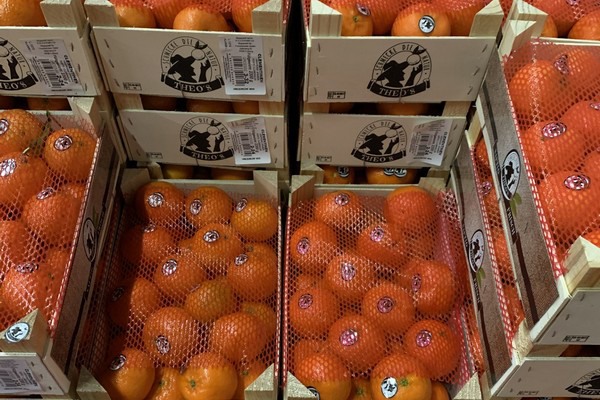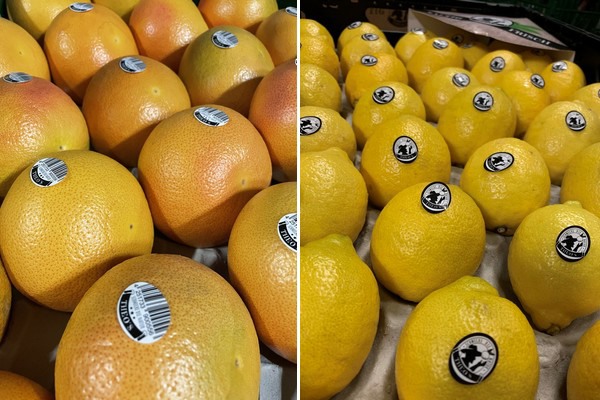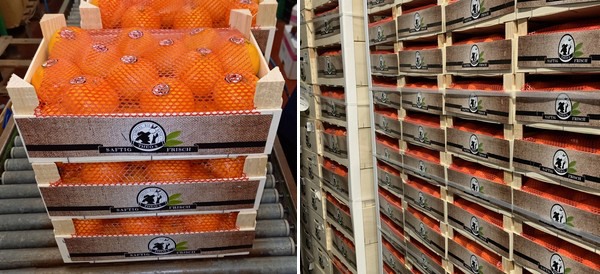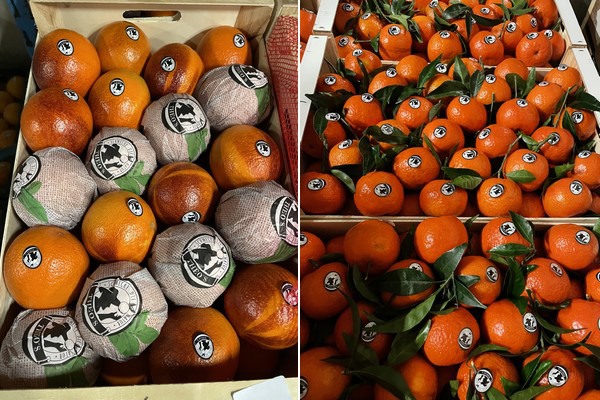The excessively mild climate is having a noticeable impact on Spanish citrus cultivation this year. The lack of cold hours is generally reflected in weaker tree growth and the low rainfall is leading to more depleted soil, which in turn is having a negative impact on production volumes. "These negative climatic conditions are leading to lower harvest volumes, especially for the early clementines and oranges," explains Thomas Heizmann from the Freiburg-based family business Frischebrüder Ltd.
This year's citrus season started in week 42/43 with the early clementines Clemenrubi and Oronules. The taste of the fruit was perfect right from the start. Heizmann: "However, small volumes of caliber 1-2 were available. This is because the majority were caliber 3 and 4, and a small proportion were caliber 5."
The first Arrufatina, Mioro and Clemenpons clementines were loaded at the end of week 43, followed by the first Clemenules in week 45. "The total quantity of Clemenules will be significantly lower than last year. Due to two severe storms with hail in the month of August in the main growing region of Castellón, the harvest volume for the current season has been reduced once again. For the subsequent varieties Clemenvilla, Tango, Nadorcott and Orri, which are available for the months of January to April/May, we expect similar volumes to last year."
 Clementines in wooden crates.
Clementines in wooden crates.
The situation is similar for oranges, Heizmann continues. "The early Navelina variety is forecast to produce significantly smaller harvests than last year. In addition, the Navelina variety has an atypical, elongated rather than round shape this year. The early oranges are also dominated by medium to small-sized produce, i.e. caliber 4-6. For the late varieties Navel and Lane Late, Navel Powel and Chislett, we are also expecting lower volumes compared to last year's campaign."
Lemons are a positive exception on the citrus market, with significantly
lemons, where significantly larger harvests are predicted compared to last year. Here too, however, the caliber is currently rather small to medium, according to Heizmann. "Later in the season, however, the fruit on the trees will increase in size, so that by the beginning of December at the latest, there will also be sufficient large-falling calibers. An increase of around 15-20 percent is forecast for the Primofiori variety and even an increase of 40-50 percent for the Verna variety compared to the previous year." The Spanish citrus range of Frischebrüder is rounded off by grapefruits, for which similar volumes to last year are expected.
 Grapefruits and lemons.
Grapefruits and lemons.
Cost increases and competition on the European citrus market
In recent months, the situation described above has led to unprecedented prices being paid for clementines, mandarins and oranges in or on the field, observes the fruit importer. "Large organizations and packing houses have paid 'independent producers' very high prices for their goods. As a result, prices for the citrus fruits mentioned above in particular are once again expected to be significantly higher than in the previous year. This trend is being exacerbated by the sometimes extreme cost increases in all areas, whether energy, packaging or diesel."
 The philosophy behind the private label is "From the tree straight to your home - THEO's fruit - taste nature."
The philosophy behind the private label is "From the tree straight to your home - THEO's fruit - taste nature."
In addition to citrus fruits from Spain, grapefruits and lemons from Turkey as well as clementines and lemons from Italy are currently available. "Greece will start the season with the first clementines in week 48 and the first oranges in week 49/50," says Heizmann. "However, it should be noted that these countries also have to contend with the same climatic changes, such as mild temperatures and a lack of rainfall. Greece, for example, is expecting similar quantities of clementines to last year, but predominantly smaller calibers. For oranges, significantly smaller quantities and also smaller calibers are available. The picture is therefore very similar in almost all growing regions/countries, where climate change is becoming increasingly noticeable."
 Sanguinelli blood oranges (l) and leaf clementines.
Sanguinelli blood oranges (l) and leaf clementines.
Private label on the rise
Founded in 2019, Frischebrüder has been trading Spanish citrus fruits under its established private label Theo's Früchte for three years now. "We work exclusively with selected producers who fully meet all of Theo's quality criteria. By optimizing the value chain, we ensure short, direct supply routes. In addition to supplying our regional customers in the greater Freiburg area, we also find new customers outside the region every year who we can convince of our own brand," Heizmann concludes.
Images: Frischebrüder GmbH
For more information:
Thomas Heizmann
Frischebrüder GmbH
Stübeweg 53
79108 Freiburg im Breisgau
Tel.: + 49 761 559 37-0
Fax: + 49 761 506 320
mail@frischebrueder.de
www.frischebrueder.de
